Why are some healed and others not? table of contents
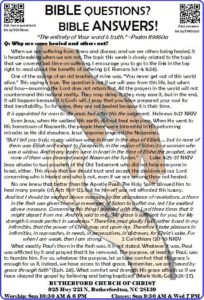 When we are suffering from illness and disease, and we see others being healed, it is heartbreaking when we are not. The topic this week is closely related to the topic that we covered last time on suffering. I encourage you to read the previous entry about the benefits of suffering (cf. Romans 5:3-4; 8:24).
When we are suffering from illness and disease, and we see others being healed, it is heartbreaking when we are not. The topic this week is closely related to the topic that we covered last time on suffering. I encourage you to read the previous entry about the benefits of suffering (cf. Romans 5:3-4; 8:24).What about the mistreatment of animals? table of contents
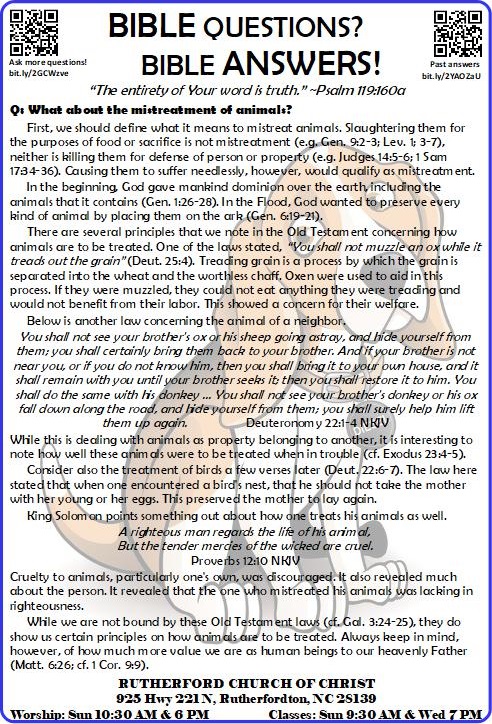 First, we should define what it means to mistreat animals. Slaughtering them for the purposes of food or sacrifice is not mistreatment (e.g. Gen. 9:2-3; Lev. 1), neither is killing them for defense of person or property (e.g. Judges 14:5-6; 1 Sam. 17:34-36). Causing them to suffer needlessly, however, would qualify as mistreatment.
First, we should define what it means to mistreat animals. Slaughtering them for the purposes of food or sacrifice is not mistreatment (e.g. Gen. 9:2-3; Lev. 1), neither is killing them for defense of person or property (e.g. Judges 14:5-6; 1 Sam. 17:34-36). Causing them to suffer needlessly, however, would qualify as mistreatment.But the tender mercies of the wicked are cruel.
Proverbs 12:10 NKJV
What about separation and divorce? table of contents
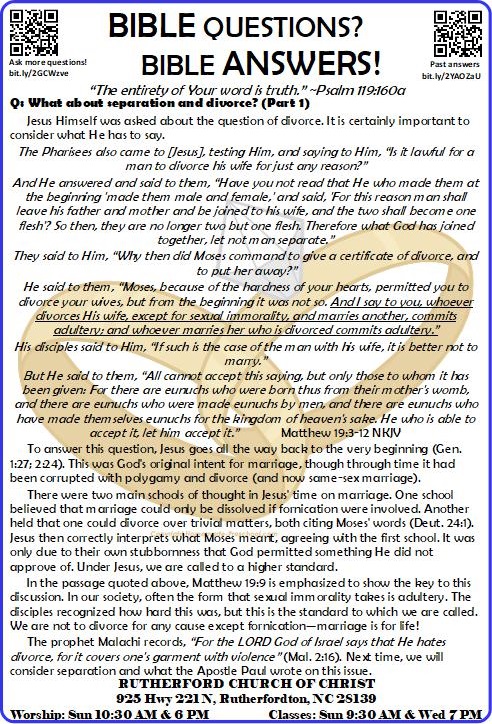 Jesus Himself was asked about the question of divorce. It is certainly important to consider what He has to say.
Jesus Himself was asked about the question of divorce. It is certainly important to consider what He has to say.
The Pharisees also came to [Jesus], testing Him, and saying to Him, “Is it lawful for a man to divorce his wife for just any reason?”
And He answered and said to them, “Have you not read that He who made them at the beginning ‘made them male and female,’ and said, ‘For this reason man shall leave his father and mother and be joined to his wife, and the two shall become one flesh’? So then, they are no longer two but one flesh. Therefore what God has joined together, let not man separate.”
They said to Him, “Why then did Moses command to give a certificate of divorce, and to put her away?”
He said to them, “Moses, because of the hardness of your hearts, permitted you to divorce your wives, but from the beginning it was not so. And I say to you, whoever divorces His wife, except for sexual immorality, and marries another, commits adultery; and whoever marries her who is divorced commits adultery.”
His disciples said to Him, “If such is the case of the man with his wife, it is better not to marry.”
But He said to them, “All cannot accept this saying, but only those to whom it has been given: For there are eunuchs who were born thus from their mother’s womb, and there are eunuchs who were made eunuchs by men, and there are eunuchs who have made themselves eunuchs for the kingdom of heaven’s sake. He who is able to accept it, let him accept it.”
Matthew 19:3-12 NKJV
To answer this question, Jesus goes all the way back to the very beginning (Gen. 1:27; 2:24). This was God’s original intent for marriage, though through time it had been corrupted with polygamy and divorce (and now same-sex marriage).
There were two main schools of thought in Jesus’ time on marriage. One school believed that marriage could only be dissolved if fornication were involved. Another held that one could divorce over trivial matters, both citing Moses’ words (Deut. 24:1). Jesus then correctly interprets what Moses meant, agreeing with the first school. It was only due to their own stubbornness that God permitted something He did not approve of. Under Jesus, we are called to a higher standard.
In the passage quoted above, Matthew 19:9 is emphasized to show the key to this discussion. In our society, often the form that sexual immorality takes is adultery. The disciples recognized how hard this was, but this is the standard to which we are called. We are not to divorce for any cause except fornication—marriage is for life!
The prophet Malachi records, “For the LORD God of Israel says that He hates divorce, for it covers one’s garment with violence” (Mal. 2:16). Next time, we will consider separation and what the Apostle Paul wrote on this issue.
Part 2
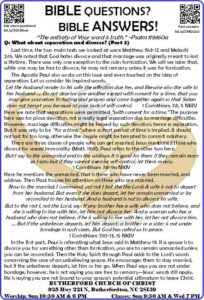 Last time, the two main texts we looked at were Matthew 19:3-12 and Malachi 2:16. We noted that God hates divorce and that marriage was originally meant to last a lifetime. There was only one exception to the rule: fornication. We will see later that, while one may be free to divorce, he may not remarry unless it was for fornication.
Last time, the two main texts we looked at were Matthew 19:3-12 and Malachi 2:16. We noted that God hates divorce and that marriage was originally meant to last a lifetime. There was only one exception to the rule: fornication. We will see later that, while one may be free to divorce, he may not remarry unless it was for fornication.
The Apostle Paul also wrote on this issue and even touched on the idea of separation. Let us consider his inspired words.
Let the husband render to his wife the affection due her, and likewise also the wife to her husband …. Do not deprive one another except with consent for a time, that you may give yourselves to fasting and prayer; and come together again so that Satan does not tempt you because of your lack of self-control.
1 Corinthians 7:3, 5 NKJV
Here we note that separations were permitted “with consent for a time.” The purpose here was for pious devotion, not a really legal separation due to marriage difficulties. However, marriage difficulties might be helped by such devotion, hence a separation. But it was only to be “for a time,” where a short period of time is implied. It should not last for too long, otherwise the couple might be tempted to commit adultery.
There are three classes of people who can get married. Jesus mentioned those who divorce for sexual immorality (Matt. 19:9). Paul refers to the other two here.
But I say to the unmarried and to the widows: It is good for them if they remain even as I am; but if they cannot exercise self-control, let them marry.
1 Corinthians 7:8-9a NKJV
Here he mentions the unmarried, that is those who have never been married, and widows. Then Paul focuses his attention on those who are married.
Now to the married, I command, yet not I but the the Lord: A wife is not to depart from her husband. But even if she does depart, let her remain unmarried or be reconciled to her husband. And a husband is not to divorce his wife.
But to the rest I, not the Lord, say: If any brother has a wife who does not believe, and she is willing to live with him, let him not divorce her. And a woman who has a husband who does not believe, if he is willing to live with her, let her not divorce him. … But if the unbeliever departs, let him depart; a brother or a sister is not under bondage in such cases. But God has called us to peace.
1 Corinthians 7:10-13, 15 NKJV
In the first part, Paul is reiterating what Jesus said in Matthew 19. If a spouse is to divorce you for something other than fornication, you are to remain unmarried unless you can be reconciled. Then the Holy Spirit through Paul adds to the Lord’s words concerning the case of an unbelieving spouse. He encourages them to stay married, but if the unbeliever departs, let him or her go. When Paul says you are not under bondage, however, he is not saying you are free to remarry—Jesus’ words still apply. He is saying you are not bound to your spouse’s potential ultimatum to leave Christ.
Additional: All of this may seem extreme, but it simply emphasizes the importance of marriage and that we should not take such decisions lightly. They have lifelong consequences. Marriage is a commitment for life, a responsibility that must not be shirked. The first marriage commitment you made is still valid while you both live, assuming fornication is not involved. A second commitment does not invalidate the first; the first invalidates the second. Again, this may seem harsh in this day and age, but I turn your attention to the Jews who were in marriages they were not supposed to be in (Ezra 10:2-4, 44). While the situations are not exactly the same, it lets us know that some of the excuses we make for not obeying the Lord in this matter are not good enough.
Heaven is worth sacrificing some temporary happiness we might have in our short time on this Earth.
What does the Bible say about homosexuality? table of contents
 Of all the things that we have covered thus far, this may be the most controversial issue among religious circles today. Please note that hatred for our fellow man has no place in Christianity. After all, Jesus loved us so much that He died for us all. That said, there are certain behaviors that are clearly sinful and wrong. If we continue in such behaviors our souls will be lost. In fact, the Apostle Paul makes this very clear.
Of all the things that we have covered thus far, this may be the most controversial issue among religious circles today. Please note that hatred for our fellow man has no place in Christianity. After all, Jesus loved us so much that He died for us all. That said, there are certain behaviors that are clearly sinful and wrong. If we continue in such behaviors our souls will be lost. In fact, the Apostle Paul makes this very clear.
Do you not know that the unrighteous will not inherit the kingdom of God? Do not be deceived. Neither fornicators, nor idolaters, nor adulterers, nor homosexuals, nor sodomites, nor thieves, nor covetous, nor drunkards, nor revilers, nor extortioners will inherit the kingdom of God. And such were some of you.
1 Corinthians 6:9-11a NKJV
Fornication is defined as all manner of sexual immorality, ranging from premarital relations to bestiality. Included in that is adultery, homosexuality, and sodomy, but these receive greater attention here because these were particular problems in Corinth. The words translated in the NKJV as homosexuals and sodomites are translated as “men who practice homosexuality” in the ESV with the footnote, “The two Greek terms translated by this phrase refer to the passive and active partners in consensual homosexual acts.”
It should be noted that the beginning of verse 11 states that some of the Corinthian Christians had once in their former lives practiced homosexual behavior. But like all unrighteous acts listed in the previous verses, this sinful behavior was caused by an active choice to give in to temptation. The passage clearly teaches that to continue practicing such behavior excludes one from the kingdom of God.
Even though these words refer to men who practice homosexuality, we should not think that women who practice it are acceptable to God. Paul also comments on this.
For this reason God gave them up to vile passions. For even their women exchanged the natural use for what is against nature. Likewise also the men, leaving the natural use of the woman, burned in their lust for one another, men with men committing what is shameful, and receiving in themselves the penalty of their error which was due.
Romans 1:26-27 NKJV
Note that Paul calls these vile passions, plainly describing both male and female homosexual behavior, declaring them against nature. The word translated as use is a reference to sexual intercourse, both men and women abandoning God’s original purpose. Jesus said, “But from the beginning of creation, God ‘made them male and female.’ ‘For this reason a man shall leave his father and mother and be joined to his wife, and the two shall become one flesh.’” (Mark 10:6-8a; cf. Gen. 1:27; 2:24).
Additional: Some argue that Jesus never spoke anything about this issue, ignoring the God-inspired words of the Apostle Paul. First, Jesus was speaking primarily to Jews who knew that homosexuality was sinful (Lev. 18:22; 20:13). Second, Jesus did speak on marriage as being heterosexual, as we discussed recently on the topic of divorce (Matt. 19:4-6).
The Bible is clear: homosexual behavior is sinful. All sin separates us from God, and all of us commit sin and need the gospel. Knowing this, we would all do well to treat each other with greater humility, and show the love and compassion that Christ showed an adulterous woman, saying, “Go and sin no more” (John 8:2-11).
If we are born in Christ’s image, why aren’t we invisible? table of contents
 This is clearly a question that is less than serious. But it gives us an opportunity to talk about what it means to be in the image of Christ. First there are some things to set forth. God is, indeed, invisible, though He has the ability to manifest Himself in this world (e.g. Exo. 33:17-23). Humans are made in the image of God. When we become a Christian, we have been born again. Finally, this means we are to be “conformed to the image of His Son,” that is Christ (Rom. 8:29). We will discuss each of these points, and then consider what it means to be conformed to His image.
This is clearly a question that is less than serious. But it gives us an opportunity to talk about what it means to be in the image of Christ. First there are some things to set forth. God is, indeed, invisible, though He has the ability to manifest Himself in this world (e.g. Exo. 33:17-23). Humans are made in the image of God. When we become a Christian, we have been born again. Finally, this means we are to be “conformed to the image of His Son,” that is Christ (Rom. 8:29). We will discuss each of these points, and then consider what it means to be conformed to His image.
Invisible God. The Apostle John, while imploring his readers to love one another, points out that no one has seen God at any time (1 John 4:12, 20). Paul writes of the invisible God and His invisible attributes (1 Tim. 1:17; Rom. 1:20). Jesus, however, was flesh and blood and most definitely visible while He walked this earth (1 John 1:1-3). As God, He was made manifest on earth in bodily form (John 1:1-3, 14; Col. 2:9).
Additional: When Paul wrote of God’s invisible attributes, he said some other interesting things there, too. “For since the creation of the world His invisible attributes are clearly seen, being understood by the things that are made, even His eternal power and Godhead, so that they are without excuse” (Rom. 1:20). While God Himself is invisible, He has certain characteristics that are quite visible and even understandable. These characteristics mean that a lack of belief in Him is inexcusable. After all, Creation itself is visible and shouts out that it was Created, in particular concerning the amazing wisdom and complexity that has it possesses. The obvious design in Creation demands a Creator, a Designer. As the writer of Hebrews states, “For every house is built by someone, but He who built all things is God” (Heb. 3:4).
Made in God’s image. When God created man and woman, He created them in His own image, in His likeness (Gen. 1:26-27). In order to see what that means, let us see what separates us from other living beings. Aside from the fact that we have a soul, we are also self-aware and have a sense of right and wrong (Eccl. 3:21). Animals do not possess these traits.
Born again. Nicodemus was very confused by Jesus’ words about what it means to be born again. We must be born again in order to be saved, so it is a very important concept for us to understand. We are to be born of water and the Spirit (John 3:3-6) which is done through God’s word, by His will (1 Pet. 1:23; John 1:12-13). When one is born again, he is made a new creation in Christ (2 Cor. 5:17). This is a spiritual and internal change that must be reflected by our actions.
Conformed to His image. Later in his letter to the Roman Christians, Paul states that we are not to be conformed to this world (Rom. 12:2). That means we are not meant to be indistinguishable from others in the world. One desire many of us have is to blend in, not to stand out. But being a Christian requires us to live like one, to “imitate Christ” (1 Cor. 11:1). By doing this, we will naturally stand out. He showed us how we can live without sin since He was without sin Himself (Heb. 4:14-15). While we all have weaknesses, the point is to strive, to grow, to be more like Christ every day. That’s what it means to be conformed to His image—no easy task!
We had no say in our first birth, our natural one. But we do have say in our second birth, one that is spiritual. Jesus said that to be born again, one must be born of water and the Spirit. That is a reference to baptism in water done in faith. Then we must live a life worthy of Christ because we have died to sin (Rom. 6:1-2). If we have believed and have been baptized into Christ, we have been baptized into His death and become a new man in Christ (Rom. 6:3-6, 17). Let us live like it, being conformed to His image, the image of our Lord and Savior Jesus Christ!
What about “once saved, always saved”? table of contents
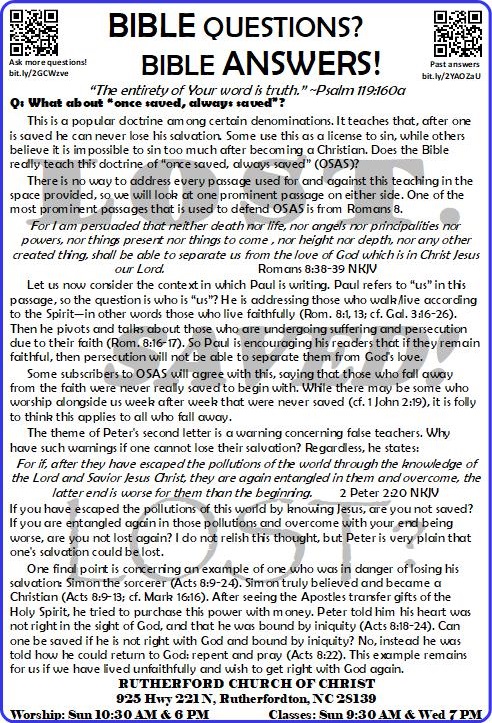 This is a popular doctrine among certain denominations. It teaches that, after one is saved he can never lose his salvation.
This is a popular doctrine among certain denominations. It teaches that, after one is saved he can never lose his salvation.
Additional: It has its origins in the teachings of John Calvin, the theologian who systematized a doctrine on how God saves man, commonly called Calvinism. There are five major points to this teaching, with something similar to OSAS (once saved always saved) being the last one. Ironically, those who typically hold to OSAS will deny the other four points.
Some use this as a license to sin, while others believe it is impossible to sin too much after becoming a Christian. Does the Bible really teach this doctrine of “once saved, always saved”?
There is no way to address every passage used for and against this teaching in the space provided, so we will look at one prominent passage on either side. One of the most prominent passages that is used to defend OSAS is from Romans 8.
For I am persuaded that neither death nor life, nor angels nor principalities nor powers, nor things present nor things to come , nor height nor depth, nor any other created thing, shall be able to separate us from the love of God which is in Christ Jesus our Lord.
Romans 8:38-39 NKJV
Let us now consider the context in which Paul is writing. Paul refers to “us” in this passage, so the question is who is “us”? He is addressing those who walk/live according to the Spirit—in other words those who live faithfully (Rom. 8:1, 13; cf. Gal. 3:16-26). Then he pivots and talks about those who are undergoing suffering and persecution due to their faith (Rom. 8:16-17). So Paul is encouraging his readers that if they remain faithful, then persecution will not be able to separate them from God’s love.
Some subscribers to OSAS will agree with this, saying that those who fall away from the faith were never really saved to begin with. While there may be some who worship alongside us week after week that were never saved (cf. 1 John 2:19), it is folly to think this applies to all who fall away.
The theme of Peter’s second letter is a warning concerning false teachers. Why have such warnings if one cannot lose their salvation? Regardless, he states:
For if, after they have escaped the pollutions of the world through the knowledge of the Lord and Savior Jesus Christ, they are again entangled in them and overcome, the latter end is worse for them than the beginning.
2 Peter 2:20 NKJV
If you have escaped the pollutions of this world by knowing Jesus, are you not saved? If you are entangled again in those pollutions and overcome with your end being worse, are you not lost again? I do not relish this thought, but Peter is very plain that one’s salvation could be lost.
One final point is concerning an example of one who was in danger of losing his salvation: Simon the sorcerer (Acts 8:9-24). Simon truly believed and became a Christian (Acts 8:9-13; cf. Mark 16:16). After seeing the Apostles transfer gifts of the Holy Spirit, he tried to purchase this power with money. Peter told him his heart was not right in the sight of God, and that he was bound by iniquity (Acts 8:18-24). Can one be saved if they are not right with God and bound by iniquity? No, instead he was told how he could return to God: repent and pray (Acts 8:22).
Additional: That is not to say that every time someone sins, he has lost his salvation. Our salvation is secure if we walk in the light as Christ is in the light (1 John 1:7). There are still things we can do to lose our salvation. The key commonality that we see in Scripture is if we continue in sin that we have not repented of. Simon was in danger of losing his salvation as was the man caught in sexual sin in 1 Cor. 5. He was named a brother (1 Cor. 5:9-11) but was to be delivered to Satan (1 Cor. 5:5). Can one be a brother and not be saved? Can one be delivered to Satan and continue to be saved? The purpose of being delivered to Satan was so that his soul could be saved, that is, so that he might repent, just as Simon was to do.
As we can see, the doctrine of OSAS does not have a leg to stand on. If you are a Christian, live faithfully so that you might receive the crown of life (Rev. 2:10). These examples remain for us if we have lived unfaithfully and wish to get right with God again.
What should our response be to COVID-19? table of contents
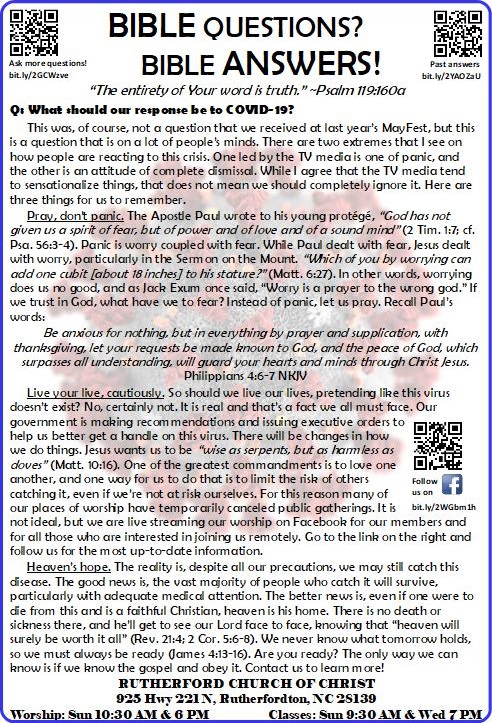 This was, of course, not a question that we received at last year’s MayFest, but this is a question that is on a lot of people’s minds. There are two extremes that I see on how people are reacting to this crisis. One led by the TV media is one of panic, and the other is an attitude of complete dismissal. While I agree that the TV media tend to sensationalize things, that does not mean we should completely ignore it. Here are three things for us to remember.
This was, of course, not a question that we received at last year’s MayFest, but this is a question that is on a lot of people’s minds. There are two extremes that I see on how people are reacting to this crisis. One led by the TV media is one of panic, and the other is an attitude of complete dismissal. While I agree that the TV media tend to sensationalize things, that does not mean we should completely ignore it. Here are three things for us to remember.
Pray, don’t panic. The Apostle Paul wrote to his young protégé, “God has not given us a spirit of fear, but of power and of love and of a sound mind” (2 Tim. 1:7; cf. Psa. 56:3-4). Panic is worry coupled with fear. While Paul dealt with fear, Jesus dealt with worry, particularly in the Sermon on the Mount. “Which of you by worrying can add one cubit [about 18 inches] to his stature?” (Matt. 6:27). In other words, worrying does us no good, and as Jack Exum once said, “Worry is a prayer to the wrong god.” If we trust in God, what have we to fear? Instead of panic, let us pray. Recall Paul’s words:
Be anxious for nothing, but in everything by prayer and supplication, with thanksgiving, let your requests be made known to God, and the peace of God, which surpasses all understanding, will guard your hearts and minds through Christ Jesus.
Philippians 4:6-7 NKJV
Live your life, cautiously. So should we live our lives, pretending like this virus doesn’t exist? No, certainly not. It is real and that’s a fact we all must face. Our government is making recommendations and issuing executive orders to help us better get a handle on this virus. There will be changes in how we do things. Jesus wants us to be “wise as serpents, but as harmless as doves” (Matt. 10:16). One of the greatest commandments is to love one another, and one way for us to do that is to limit the risk of others catching it, even if we’re not at risk ourselves. For this reason many of our places of worship have temporarily canceled public gatherings. It is not ideal, but we are live streaming our worship on Facebook for our members and for all those who are interested in joining us remotely. Go to our Facebook page and follow us for the most up-to-date information.
Heaven’s hope. The reality is, despite all our precautions, we may still catch this disease. The good news is, the vast majority of people who catch it will survive, particularly with adequate medical attention. The better news is, even if one were to die from this and is a faithful Christian, heaven is his home. There is no death or sickness there, and he’ll get to see our Lord face to face, knowing that “heaven will surely be worth it all” (Rev. 21:4; 2 Cor. 5:6-8). We never know what tomorrow holds, so we must always be ready (James 4:13-16). Are you ready? The only way we can know is if we know the gospel and obey it. Contact us to learn more!
What about denominations? table of contents
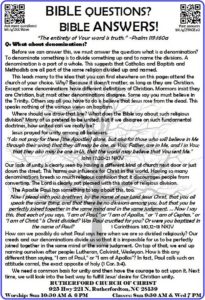 Before we can answer this, we must answer the question: what is a denomination? To denominate something is to divide something up and to name the divisions. A denomination is a part of a whole. This suggests that Catholics and Baptists and Methodists are all part of the same religion divided up and named.
Before we can answer this, we must answer the question: what is a denomination? To denominate something is to divide something up and to name the divisions. A denomination is a part of a whole. This suggests that Catholics and Baptists and Methodists are all part of the same religion divided up and named.
This leads many to the idea that you should attend the church of your choice. Why? Because it doesn’t matter, as long as they are Christian. Except some denominations have different definitions of Christian. Mormons insist they are Christian, but most other denominations disagree. Some say you must believe in the Trinity. Others say all you have to do is believe that Jesus rose from the dead. This speaks nothing of the various views on baptism.
Where should we draw that line? What does the Bible say about such religious division? Many of us pretend to be united, but if we disagree on such fundamental doctrines, how united can we really be?
Jesus prayed for unity among all believers.
“I do not pray for these [the Apostles] alone, but also for those who will believe in Me through their word; that they all may be one, as You, Father, are in Me, and I in You; that they also may be one in Us, that the world may believe that You sent Me.”
John 17:20-21 NKJV
Our lack of unity is clearly seen by having a different kind of church next door or just down the street. This harms our influence for Christ in the world. Having so many denominations breeds so much religious confusion that it discourages people from converting. The Lord is clearly not pleased with this state of religious division.
The Apostle Paul has something to say about this, too.
Now I plead with you, brethren, by the name of our Lord Jesus Christ, that you all speak the same thing, and that there be no divisions among you, but that you be perfectly joined together in the same mind and in the same judgment. … Now I say this, that each of you says, “I am of Paul,” or “I am of Apollos,” or “I am of Cephas,” or “I am of Christ.” Is Christ divided? Was Paul crucified for you? Or were you baptized in the name of Paul?
1 Corinthians 1:10,12-13 NKJV
How can we possibly do what Paul says here when we are so divided religiously? Our creeds and our denominations divide us so that it is impossible for us to be perfectly joined together in the same mind or the same judgment. On top of that, we end up naming ourselves after people: Lutheran, Calvinist, Wesleyan. How is this any different than saying, “I am of Paul,” or “I am of Apollos”? In fact, Paul calls such an attitude carnal, the exact opposite of holy (1 Cor. 3:4).
We need a common basis for unity and then have the courage to act upon it. Next time, we will look into the best way to fulfill Jesus’ desire for Christian unity.
Part 2
 Last time we looked at the lack of unity among believers in Christ. In the current religious climate, we cannot all be truly obedient to Jesus’ and Paul’s prayers and commands for unity (John 17:20-21; 1 Cor. 1:10, 12-13; 3:1-4). In fact, you will not find a single denomination in Scriptures as the cited Scriptures above condemn such sectarianism. So how can we be united in the way Scripture demands? First we must
Last time we looked at the lack of unity among believers in Christ. In the current religious climate, we cannot all be truly obedient to Jesus’ and Paul’s prayers and commands for unity (John 17:20-21; 1 Cor. 1:10, 12-13; 3:1-4). In fact, you will not find a single denomination in Scriptures as the cited Scriptures above condemn such sectarianism. So how can we be united in the way Scripture demands? First we must
reject the things that divide us and then embrace the one creed that unites us.
Reject Denominational Creeds. Time and again I have been asked, “Church of Christ? What kind of church is that?” People are asking for a denominational identity, a label that helps them better understand us. It is an understandable question, but it’s not the right question. They should ask, “Can I read about your church in the Bible?”
The church in the Bible pre-dates all denominations and man-made creeds. You cannot read of any Presbyterian, Methodist, or Baptist in Scripture. The only legitimate religious name you can find is Christian (Acts 11:26). This is the only unifying name by which we should identify. Moreover, the name of the church should also honor the One who purchased the church with His own blood (Acts 20:28), the One who sanctified and cleansed the church (Eph. 5:25-27), the One who built His church (Matt. 16:18), the One and only Christ Jesus (Rom. 16:16). If we can abandon such man-made traditions, we will be so much closer to being the church in the Bible.
Embrace the Creed We Can All Agree On. Some say that creeds merely state beliefs in a succinct and easy-to-read way, clarifying certain doctrines. Might I suggest that if your creed says more than the Bible, it says too much. If it says less than the Bible, it says too little. If it only says what the Bible says, it is unnecessary.
Can I read the Bible to find out how to be a Catholic, a Methodist, or a Baptist? No, for that I would need the Catholic Catechism, the Methodist Book of Discipline, or the Baptist Manual. So what do I need to become a Christian only? The Bible and the Bible alone. The beautiful thing is, people from every denomination already believe that the Bible is God’s Word, but many have been misguided by their traditions. The Bible is the thing we can all agree on, so it should be our only creed, the only authoritative source for our faith. We are not all going to agree on our man-made traditions or creeds. So let us abandon all of these things, and embrace the only thing that is truly reliable: the God-breathed Scriptures! After all, that is all we need to be thoroughly equipped for every good work, isn’t it?
All Scripture is given by inspiration of God, and is profitable for doctrine, for reproof,
for correction, for instruction in righteousness, that the man of God may be complete,
thoroughly equipped for every good work.
2 Timothy 3:16-17 NKJV
If you are interested in rejecting these man-made names and creeds and being the type of Christian we can read about in Scripture, please let us know. Just as Philip taught the Ethiopian eunuch, we will show you from the Scriptures what that means for you! (cf. Acts 8:30-35).
What about Freemasonry? table of contents
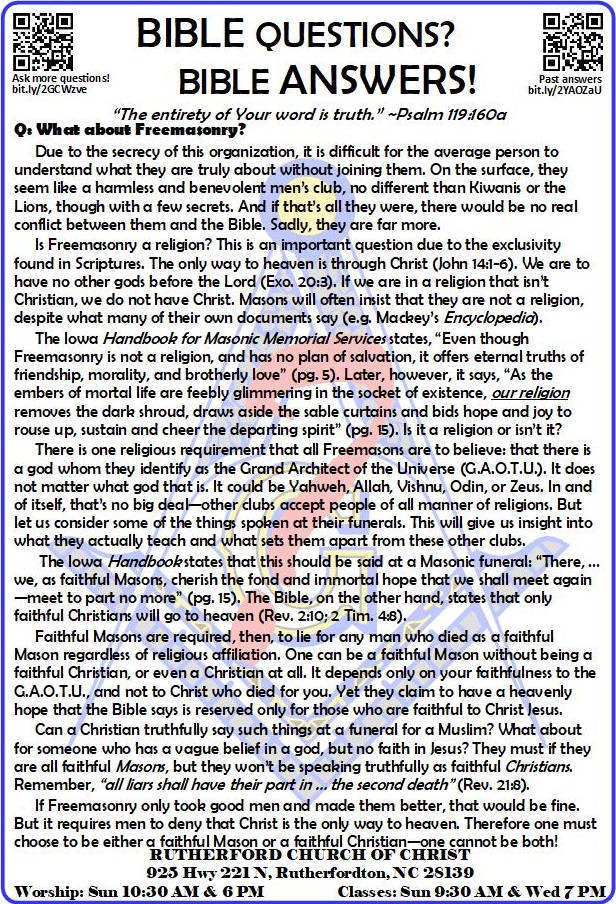 Due to the secrecy of this organization, it is difficult for the average person to understand what they are truly about without joining them. On the surface, they seem like a harmless and benevolent men’s club, no different than Kiwanis or the Lions, though with a few secrets. And if that’s all they were, there would be no real conflict between them and the Bible. Sadly, they are far more.
Due to the secrecy of this organization, it is difficult for the average person to understand what they are truly about without joining them. On the surface, they seem like a harmless and benevolent men’s club, no different than Kiwanis or the Lions, though with a few secrets. And if that’s all they were, there would be no real conflict between them and the Bible. Sadly, they are far more.
Is Freemasonry a religion? This is an important question due to the exclusivity found in Scriptures. The only way to heaven is through Christ (John 14:1-6). We are to have no other gods before the Lord (Exo. 20:3). If we are in a religion that isn’t Christian, we do not have Christ. Masons will often insist that they are not a religion, despite what many of their own documents say (e.g. Mackey’s Encyclopedia — Entry: Religion of Freemasonry).
The Iowa Handbook for Masonic Memorial Services states, “Even though Freemasonry is not a religion, and has no plan of salvation, it offers eternal truths of friendship, morality, and brotherly love” (pg. 5). Later, however, it says, “As the embers of mortal life are feebly glimmering in the socket of existence, our religion removes the dark shroud, draws aside the sable curtains and bids hope and joy to rouse up, sustain and cheer the departing spirit” (pg. 15). Is it a religion or isn’t it?
There is one religious requirement that all Freemasons are to believe: that there is a god whom they identify as the Grand Architect of the Universe (G.A.O.T.U.). It does not matter what god that is. It could be Yahweh, Allah, Vishnu, Odin, or Zeus. In and of itself, that’s no big deal—other clubs accept people of all manner of religions. But let us consider some of the things spoken at their funerals. This will give us insight into what they actually teach and what sets them apart from these other clubs.
The Iowa Handbook states that this should be said at a Masonic funeral: “There, … we, as faithful Masons, cherish the fond and immortal hope that we shall meet again—meet to part no more” (pg. 15). The Bible, on the other hand, states that only faithful Christians will go to heaven (Rev. 2:10; 2 Tim. 4:8).
Faithful Masons are required, then, to lie for any man who died as a faithful Mason regardless of religious affiliation. One can be a faithful Mason without being a faithful Christian, or even a Christian at all. It depends only on your faithfulness to the G.A.O.T.U., and not to Christ who died for you. Yet they claim to have a heavenly hope that the Bible says is reserved only for those who are faithful to Christ Jesus.
Can a Christian truthfully say such things at a funeral for a Muslim? What about for someone who has a vague belief in a god, but no faith in Jesus? They must if they are all faithful Masons, but they won’t be speaking truthfully as faithful Christians. Remember, “all liars shall have their part in the lake which burns with fire and brimstone, which is the second death” (Rev. 21:8).
If Freemasonry only took good men and made them better, that would be fine. But it requires men to deny that Christ is the only way to heaven. Therefore one must choose to be either a faithful Mason or a faithful Christian—one cannot be both!
What about communism? table of contents
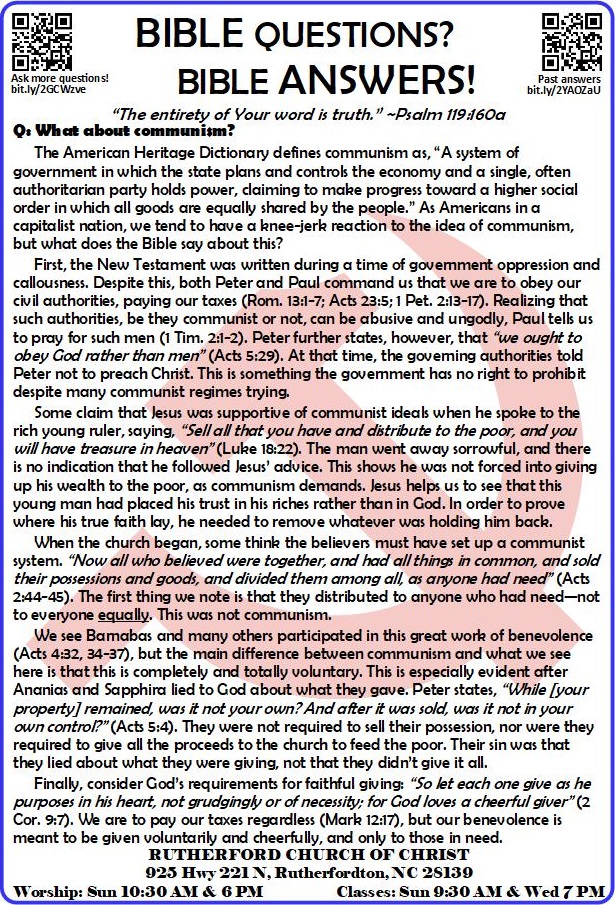 The American Heritage Dictionary defines communism as, “A system of government in which the state plans and controls the economy and a single, often authoritarian party holds power, claiming to make progress toward a higher social order in which all goods are equally shared by the people.” As Americans in a capitalist nation, we tend to have a knee-jerk reaction to the idea of communism, but what does the Bible say about this?
The American Heritage Dictionary defines communism as, “A system of government in which the state plans and controls the economy and a single, often authoritarian party holds power, claiming to make progress toward a higher social order in which all goods are equally shared by the people.” As Americans in a capitalist nation, we tend to have a knee-jerk reaction to the idea of communism, but what does the Bible say about this?
First, the New Testament was written during a time of government oppression and callousness. Despite this, both Peter and Paul command us that we are to obey our civil authorities, paying our taxes (Rom. 13:1-7; Acts 23:5; 1 Pet. 2:13-17). Realizing that such authorities, be they communist or not, can be abusive and ungodly, Paul tells us to pray for such men (1 Tim. 2:1-2). Peter further states, however, that “we ought to obey God rather than men” (Acts 5:29). At that time, the governing authorities told Peter not to preach Christ. This is something the government has no right to prohibit despite many communist regimes trying.
Some claim that Jesus was supportive of communist ideals when he spoke to the rich young ruler, saying, “Sell all that you have and distribute to the poor, and you will have treasure in heaven” (Luke 18:22). The man went away sorrowful, and there is no indication that he followed Jesus’ advice. This shows he was not forced into giving up his wealth to the poor, as communism demands. Jesus helps us to see that this young man had placed his trust in his riches rather than in God. In order to prove where his true faith lay, he needed to remove whatever was holding him back.
When the church began, some think the believers must have set up a communist system. “Now all who believed were together, and had all things in common, and sold their possessions and goods, and divided them among all, as anyone had need” (Acts 2:44-45). The first thing we note is that they distributed to anyone who had need—not to everyone equally. This was not communism.
We see Barnabas and many others participated in this great work of benevolence (Acts 4:32, 34-37), but the main difference between communism and what we see here is that this is completely and totally voluntary. This is especially evident after Ananias and Sapphira lied to God about what they gave. Peter states, “While [your property] remained, was it not your own? And after it was sold, was it not in your own control?” (Acts 5:4). They were not required to sell their possession, nor were they required to give all the proceeds to the church to feed the poor. Their sin was that they lied about what they were giving, not that they didn’t give it all.
Finally, consider God’s requirements for faithful giving: “So let each one give as he purposes in his heart, not grudgingly or of necessity; for God loves a cheerful giver” (2 Cor. 9:7). We are to pay our taxes regardless (Mark 12:17), but our benevolence is meant to be given voluntarily and cheerfully, and only to those in need.